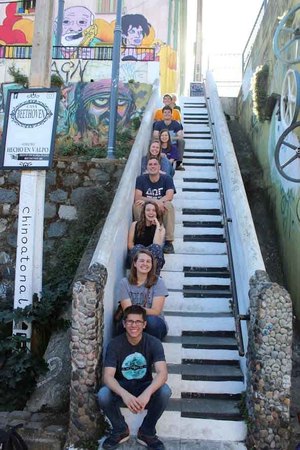Requirements
The Spanish Program offers undergraduates various options: a major, a major with an honors track, a supplementary major, international economics/Spanish, and the romance languages major.
Major Requirements
Spanish Major Advising Worksheet

The full major in Spanish requires 10 courses that total at least 30 credits at the 20202 level or above including:
- Required Courses (5)
- ROSP 30310 (Introduction to Hispanic Literature and Cultures)
- (3) core courses in advanced literature and culture numbered 30710 and above
- ROSP 53000 Senior Seminar (Fall senior year)
- Electives (5)
- (2) no more than two at the 20202-29999-level
- (1) 30000/40000-level course
- (2) at least two ROSP 40000-level course
Literature and culture classes at the 40000 level may count toward the 3 core courses in advanced literature and culture or as electives but may not double count. Courses at the 30000 level but below 30710 or courses at the 30000 level whose focus is not literature and culture may count only as electives.
Equivalent literature and culture courses from international study programs or other universities may be substituted with departmental approval. A minimum of fifty percent of the credits toward the major must be taken in residence at Notre Dame. AP credit may not be applied toward the major.
Students are allowed to take one related course in English outside of the department of Romance Language, and Literatures (for example, Colonial Latin American History, taken in the History Department) or one course in Spanish outside of the discipline of literature and culture (for example, a theology course taken in Spanish in a study abroad program), in conjunction with Spanish advisor and DUS approval. Approved courses would count as an elective only.
Honors Track Requirements
To be eligible for the honors track in Spanish, students must be full majors with a minimum GPA of 3.7 in the major, and at least seven courses completed toward the major. Although Spanish majors are admitted to the honors track by invitation, qualified students may petition for admission in the second semester of their junior year.
What is the honors track?
To be eligible for the honors track in Spanish, students must be full majors with a minimum GPA of 3.7 in the major, and at least seven courses completed toward the major. It is strongly recommended that students take at least one 40000-level class at Notre Dame by the end of their junior year.
In addition to the general requirements for the major, Honors Track students must complete an eleventh course or 3.0 additional credit hours. Highly motivated students who have already been accepted to the Honors Track may consider one of the following options:
- Completing an honors thesis (35-45 pages) course under faculty direction. The student will receive (3.0) credits in the spring semester for writing the thesis that typically builds from the Senior Seminar course..
- Completing a graduate-level ROSP course earning a grade of A- or higher, in which they will write a substantive research paper which constitutes the honor's thesis. If the student does not maintain the 3.7 GPA through graduation and/or earns a grade less than an A-, he or she will receive credit for the course but will not graduate with honors.
Although Spanish majors are admitted to the honors track by invitation, qualified students may petition for admission in the second semester of their junior year.
For full consideration, students should .please contact either Professor Keith Schaefer, Director of Undergraduate Studies, or Professor Katie Oswald, Associate Director of Undergraduate Studies in Spanish, no later than March 15 of their junior year. Applications for eligible seniors will be accepted through October 1st. Final decisions on admission to the honors track will be made in consultation with Spanish program faculty and the DUS.
Supplementary Major Requirements
Spanish Supplementary Major Advising Worksheet
The full major in Spanish requires 8 courses that total at least 24 credits at the 20202 level or above including:

- Required Courses (4)
- ROSP 30310 (Introduction to Hispanic Literature and Cultures)
- (3) core courses in advanced literature and culture numbered 30710 and above
- Electives (4)
- (2) no more than two at the 20202-29999-level
- (1) 30000/40000-level course
- (1) at least one ROSP 40000-level course
Literature and culture classes at the 40000 level may count toward the 3 core courses in advanced literature and culture or as electives but may not double count. Courses at the 30000 level but below 30710 or courses at the 30000 level whose focus is not literature and culture may count only as electives.
Equivalent literature and culture courses from international study programs or other universities may be substituted with departmental approval. A minimum of fifty percent of the credits toward the major must be taken in residence at Notre Dame. AP credit may not be applied toward the major.
Students are allowed to take one related course in English outside of the department of Romance Language, and Literatures (for example, Colonial Latin American History, taken in the History Department) or one course in Spanish outside of the discipline of literature and culture (for example, a theology course taken in Spanish in a study abroad program), in conjunction with Spanish advisor and DUS approval. Approved courses would count as an elective only.
Senior Thesis
We encourage all majors to write a thesis. During your senior year, you will register in the FALL for the Senior Seminar (ROSP 53000), conducted in the target language, and during this time you will choose your thesis topic and begin to develop the thesis. In the spring semester, you will register for the independent study course designated as Senior Thesis (1.0 credit hours) in order to complete your thesis under the direction of your supervising professor
What is the senior thesis?
The Senior Thesis is a written capstone project that typically involves a significant research component, but the emphasis is still on original thought. Regardless of the nature of the project, the Senior Thesis might best be viewed as an extended essay. In formulating, researching, and writing the Thesis, students majoring in Spanish will work one-on-one with a Thesis director.
Your thesis will be a written document of approximately 40 pages in length. The thesis may be written in English or Spanish.
Students should begin thinking about a Thesis or Project in their third year at Notre Dame. Those who study in Spain or Latin America in the spring of their junior year may want to write to professors they might want to work with, indicating their potential thesis interests. Ideally, students will begin to research topics and prepare a reading list for the thesis during the summer before their senior year. Typically, the advisor for the project will be a faculty member in Spanish. Both advisor and student will agree on the amount of consultation required and deadlines for submitting drafts and completing readings. It is important that all parties have a clear sense of procedures and deadlines.
Students planning to write a Senior Thesis in Spanish must:
- Submit the title and abstract of the project, along with the names and signatures of their advisor and readers by October 15th of the student’s senior year
- Complete at least an outline and a bibliography for the project during the fall semester while taking the Senior Seminar; for many students the paper required for completion of the Senior Seminar will form part of the final thesis
- The second semester of the senior year must be devoted to completing the writing or the project work, and a full draft of the thesis or project must be submitted to the advisor by March 15th
- The final, complete version of the thesis or project must be submitted by April 15th. Students should submit one copy to each reader and one electronic and one hard copy to the Department.****
Interdisciplinary Minors
Spanish courses may be applied toward one of the interdisciplinary minors offered through the Kellogg Institute, Institute for Latino Studies, the Medieval Institute and the Nanovic Institute for European Studies, and the Portuguese Minor.